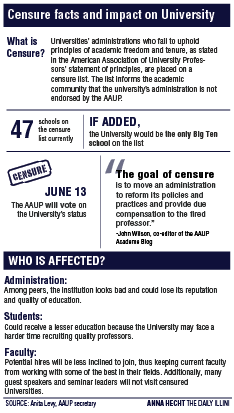Former AAUP president: ‘University likely to face censure’

February 23, 2015
While facing the possibility of censure from the American Association of University Professors, the University could avoid it by changing its policies or coming to an agreement with Steven Salaita, said Cary Nelson, former AAUP president and English professor.
The AAUP will vote on whether to censure University administrations at its national annual conference on June 13.
There are currently 47 school administrations on the AAUP censure list. Many are small, religious schools and some have been censured for over 50 years. If the University is censured it will be the only Big Ten school currently on the list.
In August, the University rescinded Steven Salaita’s appointment, claiming some of his tweets regarding conflict in Gaza were uncivil.
The AAUP wrote Chancellor Phyllis Wise to warn her of the consequences that could follow. Since Salaita’s employment was revoked, the University has lost several guest speakers, received votes of no confidence from 15 departments, is facing two legal battles against Salaita and is now facing the possibility of censure.
Get The Daily Illini in your inbox!
“Censure results from the association’s findings that conditions for academic freedom and tenure are unsatisfactory at a college or university,” according to the AAUP website.
The AAUP’s department of academic freedom, tenure and governance will visit the campus Thursday and Friday, observing and conducting interviews with various faculty members, said Anita Levy, associate secretary for the AAUP’s department of academic freedom, tenure and governance. The visit will help the department finalize its report on its investigation into the handling of Salaita’s case, and the report will be released soon after.
John Wilson, co-editor of AAUP’s Academe Blog, said he believes a report recommending the administration to be censured would be valid.
“A censure vote against the University of Illinois is appropriate and necessary, because of the violation of fundamental standards of academic freedom that the AAUP calls for, and that the University of Illinois promises in its statutes to follow,” Wilson said.
At the Feb. 2 academic senate meeting, Nelson said AAUP censure was “pretty definite,” however, Levy said there’s a possibility the committee won’t recommend the University be placed on the censured administration list.
Harry Hilton, AAUP University chapter president, said the University’s progress toward addressing the policies that were used in Salaita’s case could help keep them off the censure list.
“If the preponderance of those recommendations is adhered to and changes are made, or changes are in the process of being made, then censure becomes moot and won’t be imposed,” Hilton said. “But that’s timetable and willingness to do something.”
Even if the committee recommends the University be placed on the censure list, there are still actions the University could take before the June vote.
“The administration and the BOT could declare clearly ‘We believe civility on campus should be encouraged and promoted because it provides the best climate for educational dialogue, but there is no intent to require, impose, or enforce civility,” Nelson said. “Incivility is not grounds to challenge an existing faculty member’s employment, though it can be a factor in hiring decisions.”
The board could also set an earlier deadline for the approval of faculty appointments and the University can instate guidelines for dealing with issues that arise when the Chancellor and Provost are reviewing new faculty appointments, Nelson said. He added these actions would narrow the grounds for censure, although will not completely eliminate the possibility.
Salaita said he would still be happy to work at the University if it is censured; however, he admitted that it is “a bit of a catch-22” considering his reinstatement would make the censure unnecessary.
“The students and instructors at the university are wonderful and it would be a great honor to join them,” Salaita said.
In September, the Board released a statement declaring they would not reconsider Salaita for a faculty position at the University. That statement was reiterated in February after the academic senate passed a resolution urging the administration to implement the recommendations of the Committee on Academic Freedom and Tenure.
Although the Board said its decision is final, it is trying to revise University policies to avoid similar issues in the future. On Feb. 16, the senate voted in favor of a resolution on new hiring procedures.
Hilton said if the AAUP does vote to censure the University at its national meeting, faculty will probably suffer more than students.
“There are some people that may not pay any attention to it, while others, particularly off campus, may want to not be hired here or may not come here for seminars,” Hilton said. “It depends on their view, how they take it.”
Wilson said the AAUP does not actually censure Universities, just university administrations. Students and faculty are not punished, but consequentially suffer the repercussions of having a censured administration.
“What it says to the academic community is that the climate for academic freedom and tenure and shared governance is not as it should be,” Levy stated.
As a result, she said the University could continue to lose speakers and seminar attendees, as well as future employees. Levy said disciplinary organizations, such as the American Historical Society, note when a University has been censured by the AAUP on job postings.
“The University of Illinois already has a major recruiting problem for faculty because the Board’s insistence on being able to overturn academic hiring decisions will lead highly desirable candidates to choose other universities,” Wilson said.
Abigale can be reached at [email protected].






